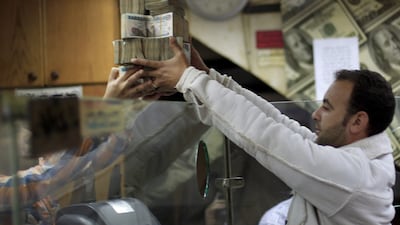Egypt’s central bank governor Tarek Amer said that a move to devalue the Egyptian currency two weeks ago has already started to pay dividends, with foreign investors making US$500 million worth of investments in stocks and bonds.
Speaking in a pre-recorded television interview broadcast on Saturday, Mr Amer also said, without giving a time frame, that the central bank had cleared $22 billion worth of imports that been waiting at ports to enter the country. He did not say either where the money came from. Egypt’s current foreign reserves stand at around $16bn and have been stable for the past year. He also said that he expects a further $5bn worth of additional investments in the next four months as the central bank moves to a more flexible exchange rate policy.
“There is no currency crisis, there is merely a crisis in managing the foreign exchange market and we will roll out an alternative plan for managing the market in the next three months,” Mr. Amer said.
Egypt’s central bank devalued the pound by about 13 per cent on March 14 and said it would be more flexible in managing its pegged currency to kill off the black market for dollars and boost exports.
The currency was devalued to 8.85 pounds (Dh3.6) from the official rate of 7.73 pounds in a $200m auction. That move took the market by surprise after the central bank governor had complained in days in leading up to the devaluation that the pound was not fairly valued and denied any plans to devalue the currency.
Egypt relies heavily on inflows of hard currency and has been suffering for years from decreasing receipts from key sources including foreign direct investment, the Suez Canal, remittances from Egyptians abroad and tourism – especially since the downing of a Russian jet in October over Sinai.
Mr Amer said in the interview that the advantages of a weaker currency would outweigh its disadvantages.
Despite Mr Amer’s optimism, the black market for hard currencies continues to haunt Egypt, and while the spread between the official rate and the black market has narrowed since the devaluation, a dollar shortage still persists and the rate in the parallel market has been quoted as high as 10 pounds per dollar this week. The governor said the black market price was a reflection of greed and speculation.
The governor also said that in July Egypt would pay Qatar the $1bn it owes it as well as $800m it owes to Paris Club countries.
mkassem@thenational.ae
* with agencies
Follow The National's Business section on Twitter

